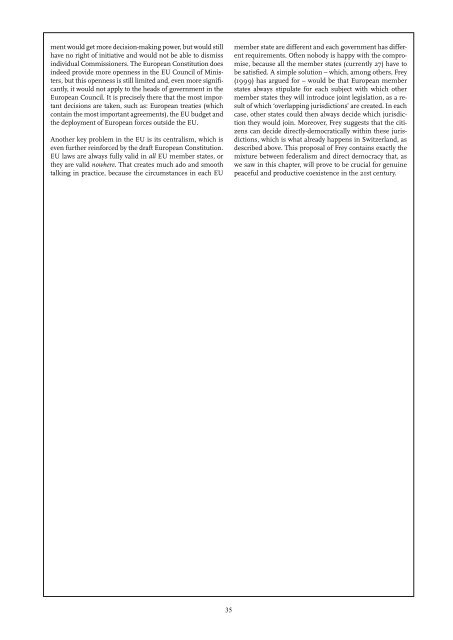Facts and Arguments about the Introduction of Initiative and ...
Facts and Arguments about the Introduction of Initiative and ...
Facts and Arguments about the Introduction of Initiative and ...
You also want an ePaper? Increase the reach of your titles
YUMPU automatically turns print PDFs into web optimized ePapers that Google loves.
ment would get more decision-making power, but would still<br />
have no right <strong>of</strong> initiative <strong>and</strong> would not be able to dismiss<br />
individual Commissioners. The European Constitution does<br />
indeed provide more openness in <strong>the</strong> EU Council <strong>of</strong> Ministers,<br />
but this openness is still limited <strong>and</strong>, even more significantly,<br />
it would not apply to <strong>the</strong> heads <strong>of</strong> government in <strong>the</strong><br />
European Council. It is precisely <strong>the</strong>re that <strong>the</strong> most important<br />
decisions are taken, such as: European treaties (which<br />
contain <strong>the</strong> most important agreements), <strong>the</strong> EU budget <strong>and</strong><br />
<strong>the</strong> deployment <strong>of</strong> European forces outside <strong>the</strong> EU.<br />
Ano<strong>the</strong>r key problem in <strong>the</strong> EU is its centralism, which is<br />
even fur<strong>the</strong>r reinforced by <strong>the</strong> draft European Constitution.<br />
EU laws are always fully valid in all EU member states, or<br />
<strong>the</strong>y are valid nowhere. That creates much ado <strong>and</strong> smooth<br />
talking in practice, because <strong>the</strong> circumstances in each EU<br />
3<br />
member state are different <strong>and</strong> each government has different<br />
requirements. Often nobody is happy with <strong>the</strong> compromise,<br />
because all <strong>the</strong> member states (currently 27) have to<br />
be satisfied. A simple solution – which, among o<strong>the</strong>rs, Frey<br />
(1999) has argued for – would be that European member<br />
states always stipulate for each subject with which o<strong>the</strong>r<br />
member states <strong>the</strong>y will introduce joint legislation, as a result<br />
<strong>of</strong> which ‘overlapping jurisdictions’ are created. In each<br />
case, o<strong>the</strong>r states could <strong>the</strong>n always decide which jurisdiction<br />
<strong>the</strong>y would join. Moreover, Frey suggests that <strong>the</strong> citizens<br />
can decide directly-democratically within <strong>the</strong>se jurisdictions,<br />
which is what already happens in Switzerl<strong>and</strong>, as<br />
described above. This proposal <strong>of</strong> Frey contains exactly <strong>the</strong><br />
mixture between federalism <strong>and</strong> direct democracy that, as<br />
we saw in this chapter, will prove to be crucial for genuine<br />
peaceful <strong>and</strong> productive coexistence in <strong>the</strong> 21st century.
















